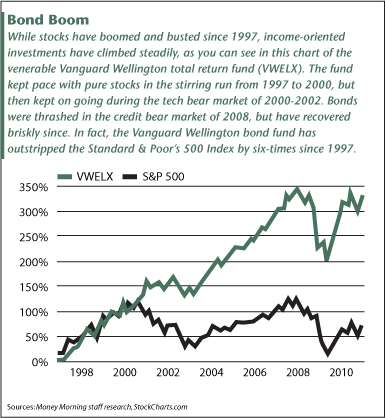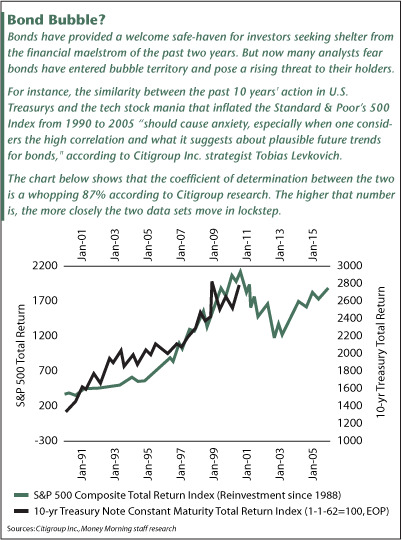Bonds have provided a welcome safe-haven for investors seeking shelter from the financial maelstrom of the past two years. But now many analysts fear bonds have entered bubble territory and pose a rising threat to their holders.
The amount of money flowing into bonds is "probably not sustainable on a consistent basis" Joel Levington, managing director of corporate credit at Brookfield Investment Management Inc., told Bloomberg News. "Eventually it won't be sustainable. Whether that means five years from now or five weeks is a little difficult to tell."
Bond funds have attracted more investment than stock funds for 31 straight months, which matches the record streak that ran from 1984 - 1987. Bond funds attracted $559 billion in the 30 months through June, according to the Investment Company Institute (ICI). Meanwhile, investors withdrew $209.4 billion from U.S. stock funds and $24.4 billion from funds that buy foreign stocks.
"No one seems to want very risky assets but they still want some kind of yield," Toby Nangle, the director of asset allocation at Baring Asset Management in London, told Bloomberg. "People generally view corporate debt as not a terribly scary place to be."
Indeed, while stocks have boomed and busted since 1997, income-oriented investments have climbed steadily, as you can see in this chart of the venerable Vanguard Wellington total return fund (VWELX). The fund kept pace with pure stocks in the stirring run from 1997 to 2000, but then kept on going during the tech bear market of 2000-2002. Bonds were thrashed in the credit bear market of 2008, but have recovered briskly since. In fact, the Vanguard Wellington bond fund has outstripped the Standard & Poor's 500 Index by six-times since 1997.

But bonds' exhilarating run-up now has some analysts uttering the dreaded "B" word: Bubble. These analysts say that the surge in bonds is comparable to the technology bubble of 10 years ago.
Indeed, the amount of cash that flowed into bond funds in the two years through June approaches the amount of money that went into stock funds during the dot-com bubble at the start of the decade. Investors poured $480.2 billion into bond funds in the two years through June, compared to the $496.9 billion that went into stock funds in the period from 1999 - 2000.
It's not just corporate debt that's raising eyebrows, either. The similarity between the past 10 years' action in U.S. Treasuries and the tech stock mania that inflated the Standard & Poor's 500 Index from 1990 to 2005 "should cause anxiety, especially when one considers the high correlation and what it suggests about plausible future trends for bonds," according to Citigroup Inc. (NYSE: C) strategist Tobias Levkovich.
The coefficient of determination between the two is a whopping 87% according to Citigroup research. The higher that number is, the more closely the two data sets move in lockstep.
Treasuries soared yesterday (Tuesday) with yields on the 30-year and 10-year notes falling to their lows levels in 16 months. The yield on the two-year note approached record low of 0.4547%, reached Aug. 20.

The government yesterday sold $37 billion of two-year securities, drawing a record low yield of 0.498%. The sale's bid-to-cover ratio, which gauges demand by comparing total bids with the amount of securities offered, was 3.12, compared with an average of 3.19 at the past 10 auctions.
"In 2000 or late 1999, we saw massive amounts of money going into the equity market at just the wrong time," Lekovich said in an Aug. 20 radio interview with Bloomberg. "I feel the same way when I look at all the money going into bonds."
Still, for bonds to go bust, a major shift in investor sentiment is needed and few analysts believe investors' risk appetite will return anytime soon.
"The technology bubble that popped beginning in 2000, the liquidity crisis that began in 2007 and 2008/2009's deep recession have provided dramatic illustration over the last 10 years that markets hold risk," Franklin Resources Inc. (NYSE: BEN) said in a report on its Web site. "With the benefit of hindsight, some investors might have chosen to avoid equities during the last decade. But many investors are turning their backs on equities now - after one of the worst decades the stock market has ever seen."
And while investors remain skittish about stocks, the U.S. Federal Reserve continues to support the bond market. The Fed will purchase about $18 billion of U.S. debt by the middle of September using proceeds from maturing mortgage bonds. The central bank bought $1.35 billion of Treasuries yesterday, taking its total since beginning the program on Aug. 17 to $7.51 billion.
"Right now, the Federal Reserve is purposefully engineering the rally in bonds to lower mortgage rates and funnel cheap credit to consumers, banks and businesses who want it," says Money Morning Contributing Editor Jon D. Markman.
"What the consequences will be, and whether this strategy of unprecedented monetary policy support will even work, are questions that will be answered in years to come," he added. "For now, all we can do is identify these trends and position ourselves to profit from them while they last. That's why I've recommended a selection of bond exchange-traded funds (ETFs). Eventually, though, this latest bubble will burst."
Indeed, there eventually will come a time when investors regain confidence and return in force to the stock market. But if they wait too long, they risk missing a potential rally.
Jack Ablin, who helps manage $55 billion as chief investment officer at the Chicago-based Harris Private Bank, says institutions are likely to lead a rebound in the stock market ahead of retail investors.
"What will happen is that the market will rally first, and retail investors will eventually jump back in," he told Bloomberg.
John Sweeney, an executive vice president at Fidelity Investments, cautioned: "Someone who is waiting for stability is likely to miss the upside."
[Editor's Note: Are you seeking investment protection in the bond market? Have you adjusted your strategy to involve fewer equities and more bonds? Do you think there is a bond bubble forming - similar to the dot-com bubble - that will take some investors by surprise? If you haven't dove into fixed-income securities, then what stocks or other instruments have you included in your portfolio for safety measures?
Send your thoughts, questions and concerns to [email protected].]
News and Related Story Links:
- Money Morning:
Are Bonds a Bubble? Don't Bet on It - Money Morning:
Bond Funds Gain Cash Like Stocks in Dot-Com Era: Credit Markets - Money Morning:
Investors Shake Up Funds With Record Bond Love Affair - Money Morning:
The Fed's Treasury Purchase Plan is Just Further Proof That It's in the Denial About the Dollar


